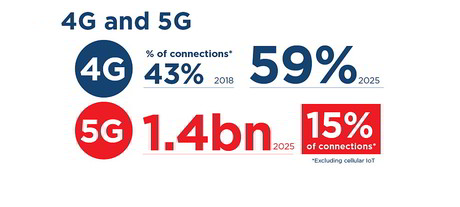5G to comprise 15% of global mobile industry by 2025

With 5G network launches on the rise, 5G will account for 15% of the global mobile industry by 2025, according to GSMA.
According to the study, mobile operators worldwide are currently investing around $160 billion per year (capex) on expanding and upgrading their networks, despite regulatory and competitive pressures.
The 2019 global edition of the GSMA’s flagship Mobile Economy report series — published at MWC Barcelona 2019 — reveals that a further 16 major markets worldwide will switch on commercial 5G networks this year, following on from the first 5G launches in South Korea and the US in 2018.
“The arrival of 5G forms a major part of the world’s move towards an era of intelligent connectivity, which, alongside developments in the Internet of Things, big data and artificial intelligence, is poised to be a key driver of economic growth over the coming years,” said Mats Granryd, Director General of the GSMA.
“While 5G will transform businesses and provide an array of exciting new services, mobile technology is also helping to close the connectivity gap. We will connect more than a billion new people to the mobile internet over the next few years, spurring adoption of mobile-based tools and solutions in areas such as agriculture, education and health care, which will improve livelihoods of people around the world.”
The new report reveals that:
- the number of 5G connections will reach 1.4 billion by 2025 — 15% of the global total. By this point, 5G is forecast to account for around 30% of connections in markets such as China and Europe, and around half of the total in the US;
- 4G will continue to see strong growth over this period, accounting for almost 60% of global connections by 2025 — up from 43% last year;
- the number of global IoT connections will triple to 25 billion by 2025, while global IoT revenue will quadruple to $1.1 trillion;
- one billion new unique mobile subscribers have been added in the four years since 2013, bringing the total to 5.1 billion by the end of 2018, representing about two-thirds of the global population;
- more than 700 million new subscribers are forecast to be added over the next seven years, about a quarter of these coming from India alone;
- an additional 1.4 billion people will start using the mobile internet over the next seven years, bringing the total number of mobile internet subscribers globally to 5 billion by 2025 (more than 60% of the population).
The report also suggests that mobile technologies and services generated 4.6% of GDP globally last year, a contribution that amounted to $3.9 trillion of economic value added. This contribution is forecast to grow to $4.8 trillion (4.8% of GDP) by 2023 as countries around the globe increasingly benefit from the improvements in productivity and efficiency brought about by increased take-up of mobile services. The mobile ecosystem also supported almost 32 million jobs in 2018 (directly and indirectly) and made a substantial contribution to the funding of the public sector, with more than $500 billion raised through general taxation.
Looking further ahead, it is forecast that 5G will contribute $2.2 trillion to the global economy over the next 15 years, with key sectors such as manufacturing, utilities, and professional and financial services benefitting the most from the new technology.
The new report, ‘The Mobile Economy 2019’, is authored by GSMA Intelligence, the research arm of the GSMA. To access the full report and related infographics, go to: www.gsma.com/mobileeconomy/.
Please follow us and share on Twitter and Facebook. You can also subscribe for FREE to our weekly newsletter and bimonthly magazine.
Originally published here.
UOMO legislation introduced to Parliament
Under the legislation, the national mobile carriers will be obliged to provide baseline outdoor...
Australian telcos increasing their coverage footprint: report
All three national mobile networks have increased their coverage footprint and bolstered the...
Govt funds wireless connectivity in North West Queensland
The Regional Connectivity Program is benefiting families, businesses and visitors in...




